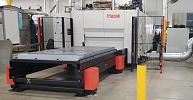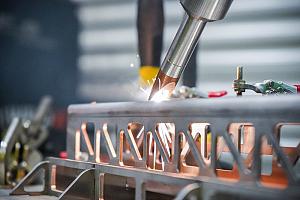Owner, Brown Dog Welding
- FMA
- The Fabricator
- FABTECH
- Canadian Metalworking
Categories
- Additive Manufacturing
- Aluminum Welding
- Arc Welding
- Assembly and Joining
- Automation and Robotics
- Bending and Forming
- Consumables
- Cutting and Weld Prep
- Electric Vehicles
- En Español
- Finishing
- Hydroforming
- Laser Cutting
- Laser Welding
- Machining
- Manufacturing Software
- Materials Handling
- Metals/Materials
- Oxyfuel Cutting
- Plasma Cutting
- Power Tools
- Punching and Other Holemaking
- Roll Forming
- Safety
- Sawing
- Shearing
- Shop Management
- Testing and Measuring
- Tube and Pipe Fabrication
- Tube and Pipe Production
- Waterjet Cutting
Industry Directory
Webcasts
Podcasts
FAB 40
Advertise
Subscribe
Account Login
Search
Mic drop: Walking off a fab shop floor
An anecdote about one metal fabricator quitting a job that wasn’t up to snuff
- By Josh Welton
- August 30, 2020

Detroit metal fabricator Josh Welton reminisces about a time he walked off a fab shop floor and quit a job following too many broken promises and red flags. Getty Images
Time was running out.
The first phase of my career was over, and for over a year I’d been waiting on the call for the next. I knew that call was coming, and it would be for the job I really wanted: prototype military fabricator. However, funds to live on until then were drying up. A date was set and rapidly approaching, a day after which I couldn’t wait any longer and I’d just need to find any job.
But a couple weeks before that date something different appeared, a new opportunity to make some money doing what I loved to do. A local, large fabrication company was hiring. It would likely be a stopgap for me, but after negotiating with the company, I felt that there was an outside shot for me to stay on and grow with them.
The job behind me - my first career phase - was as a millwright at Chrysler. After going through the apprenticeship and spending seven years at the Mack II plant in Detroit, I decided to move on. I loved the guys I worked with, and the work itself, but the continual layoffs, looming corporate bankruptcy, and my own desire to do more welding pushed me to take a buyout in 2009. With the money received from my “early, early retirement” I spent most of the next year out in my own shop. Brown Dog Welding was in its infancy and I wasn’t ready to make it my day job, but the buyout money from Chrysler afforded me the chance to grow it without worrying about making ends meet, at least for a while.
The phase 2 career call I was waiting for was from General Dynamics Land Systems (GDLS). I’d interviewed for a driver/mechanic position in their prototype shop in 2007 or 2008, but at the time I declined their offer and decided to hold off switching jobs until a buyout from Chrysler was on the table. Knowing the GDLS job (which, despite its title, was mostly welding in my case) was in my back pocket, I signed the buyout from Chrysler in early 2009. That upcoming winter I interviewed again for GDLS’s driver/mechanic spot, but it was a waiting game for their hiring freeze to lift.
In the meantime, my wife, Darla, and I were rapidly depleting our savings when this other opportunity with the local fabrication company arose – let’s call that company “FFC,” which was in need of an experienced TIG welder working mostly on stainless steel. I set up the interview and weld test then met with the supervisor. While the wages weren’t great, raises in short intervals were promised. Plus, I’d be doing what I love all day, every day: TIG welding.
I showed up to FFC on my first day ready to weld, only to find that I’d be running sheets of stainless through a machine to flatten them. Considering how, up to then, FFC hadn’t mentioned any duties outside of welding, this was a bit of a red flag. But I did it. The next day was the same deal. So I mentioned something to the supervisor. He kind of blew me off and said I would be welding soon.
OK.
I started talking with some co-workers. One of the dudes was welding, and I told him about my concerns. He told me he was sold the same deal, saying, “I was here two months before I even touched a welder!”
My heart sunk.
The more I talked to the crew around FFC, the more I heard the same shit. The boss told them it would pay well, that they’d be doing all clean, skilled TIG welding. But when they showed up for work, they were given nothing more than grunt work. And the supposed “old-timers” had only been there months. It turns out the company had gone through and wiped out a bunch of tenured, higher- paid workers and started hiring new people to start at the bottom. When I asked management about this, they said they fired them because “drug use was rampant.”
OK.
Now I was pissed. Continued conversations didn’t alleviate the anger. Every worker I talked to applied for and was hired for something completely different from what they ended up doing. They’d all been made promises right up until they accepted the job, at which point a switch flipped by management in how they were treated. The work was nasty, dirty, and demanding. On top of that, there was little to no welding.
I asked my co-workers why they stayed with the company. I mean, the pay wasn’t what they were told, and the job wasn’t what they were told. So why didn’t they walk off?
The answer was infuriating: They couldn’t leave.
FFC mainly hired workers who were on unemployment, collecting and depending on UE checks. They knew the worker gave up those benefits when they accepted a job, any job. The worker couldn’t collect unemployment if they quit, no matter the reason. And the job market wasn’t exactly on fire in Detroit in 2010. So once the worker was hired, they were trapped.
However, FFC didn’t realize that yours truly was not collecting UE in the first place. Homie don’t play that.
By my third day I’d already discussed a few of my concerns with management and, shocker, they didn’t care. Ironically, I had been given a welding job that morning, but by then my mind was pretty much made up. Before lunch I walked up to the boss’s office
.“You lied about the job.” He tried to interrupt, but I continued, “Naw, man. You’ve lied to a bunch of these guys about their jobs and their pay. I don’t need any of this shit. I’m out.” And I turned around and left. I said peace to the cats on the floor on my way out.
The only thing missing from that moment was Johnny Paycheck’s “Take This Job and Shove It” playing in the background:
Well that foreman, he's a regular dog. The line boss, he's a fool. Got a brand new flattop haircut. Lord, he thinks he's cool. One of these days I'm gonna' blow my top. And that sucker, he's gonna' pay. Lord I can't wait to see their faces. When I get the nerve to say...Take this job and shove it. I ain't working here no more
Coincidentally, one of the dudes that worked there was a friend of a friend. We didn’t know it at the time, but at some point, years later, the mutual friendship popped up through Facebook and he said to me, “Dude! You’re the guy that told them to f#%^ off, dropped the mic, and walked out! We still talk about that!”
Fortunately for him, after being forced to stick it out with FFC, they started treating him a little better. He became a superintendent on projects and made a little bit more money.
It wasn’t long after the “mic drop” that GDLS called my number and I was officially brought in as a driver/mechanic, which is what I’m still doing 10 years later.
subscribe now

The Fabricator is North America's leading magazine for the metal forming and fabricating industry. The magazine delivers the news, technical articles, and case histories that enable fabricators to do their jobs more efficiently. The Fabricator has served the industry since 1970.
start your free subscriptionAbout the Author

- Stay connected from anywhere

Easily access valuable industry resources now with full access to the digital edition of The Fabricator.

Easily access valuable industry resources now with full access to the digital edition of The Welder.

Easily access valuable industry resources now with full access to the digital edition of The Tube and Pipe Journal.
- Podcasting
- Podcast:
- The Fabricator Podcast
- Published:
- 04/30/2024
- Running Time:
- 53:00
Seth Feldman of Iowa-based Wertzbaugher Services joins The Fabricator Podcast to offer his take as a Gen Zer...
- Trending Articles
JM Steel triples capacity for solar energy projects at Pennsylvania facility

Fabricating favorite childhood memories

How laser and TIG welding coexist in the modern job shop

Robotic welding sets up small-batch manufacturer for future growth

Ultra Tool and Manufacturing adds 2D laser system

- Industry Events
Pipe and Tube Conference
- May 21 - 22, 2024
- Omaha, NE
World-Class Roll Forming Workshop
- June 5 - 6, 2024
- Louisville, KY
Advanced Laser Application Workshop
- June 25 - 27, 2024
- Novi, MI
Precision Press Brake Certificate Course
- July 31 - August 1, 2024
- Elgin,


























